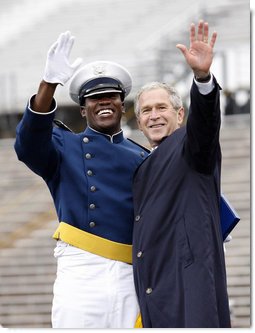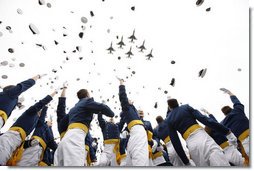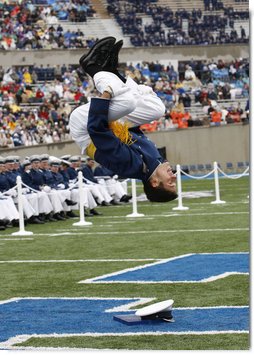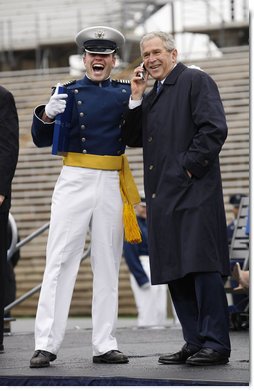
- Afghanistan
- Africa
- Budget Management
- Defense
- Economy
- Education
- Energy
- Environment
- Global Diplomacy
- Health Care
- Homeland Security
- Immigration
- International Trade
- Iraq
- Judicial Nominations
- Middle East
- National Security
- Veterans
|
Home >
News & Policies >
May 2008
|
For Immediate Release
Office of the Press Secretary
May 28, 2008
President Bush Delivers Commencement Address at United States Air Force Academy
Air Force Academy
Colorado Springs, Colorado
10:15 A.M. MDT
THE PRESIDENT: Thank you. Mr. Secretary, thank you for the kind introduction. General Moseley, General Regni; Mr. Congressman, thank you. Academy staff and faculty, distinguished guests, and proud family members. I am so pleased to stand before the future leaders of the United States Air Force.
I have something I'd like to say to the Cadet Wing: Class of 2008! (Applause.) Yes, that's good. I was a little worried you we're going to yell: "Give him the Bird!" (Laughter.)
 You're the 50th graduating class in the history of the Air Force Academy.
Each of you has worked hard to reach this moment. You survived "Beast,"
"Terazzo Sailing" -- (applause) -- "fatty bags" at Mitch's. (Laughter.)
You earned your "prop and wings" at Pinnacle -- (applause) -- and today you
will receive your degree and commission as Air Force officers. Your
teachers are proud of you, your parents are proud of you -- and so is your
Commander-in-Chief. Job well done. (Applause.)
You're the 50th graduating class in the history of the Air Force Academy.
Each of you has worked hard to reach this moment. You survived "Beast,"
"Terazzo Sailing" -- (applause) -- "fatty bags" at Mitch's. (Laughter.)
You earned your "prop and wings" at Pinnacle -- (applause) -- and today you
will receive your degree and commission as Air Force officers. Your
teachers are proud of you, your parents are proud of you -- and so is your
Commander-in-Chief. Job well done. (Applause.)
The Superintendent informs me that some of you are still on restriction. (Laughter.) It might be because you were caught running from the "Lightning Van." (Laughter.) Or it might be because of Jimmy Chad's apple. (Laughter and applause.) Whatever the reason you got your Form-10, help has arrived. In keeping with longstanding tradition, I hereby absolve all cadets who are on restriction for minor conduct offenses. (Applause.) As for your grades, well, some things are even beyond the powers of the President. (Laughter.)
In becoming officers of the United States Air Force, you have chosen a vocation that is both hazardous and rewarding. As a former F-102 pilot, I know the exhilaration of flight. As the son of an aviator who was shot down in combat, I know its perils. Whether you serve in the skies above or on the ground below, each of you has stepped forward to defend your country. You've chosen to face danger in foreign lands so your fellow citizens do not have to face danger in our own land. And I want to thank you for making this courageous choice. And all of America is grateful to the Class of 2008. (Applause.)
When you put on your Second Lieutenant bars in a few moments, you will become part of a great history -- a history that is still only beginning to unfold. By any standard, air power is still a relatively new phenomena. Men have been fighting on land and at sea for thousands of years -- yet there are still Americans among us who were born before man ever flew. In the lifetime of one generation, our nation has seen aviation progress from that first tentative liftoff at Kitty Hawk to an age of supersonic flight and space exploration.
And as flight has progressed it changed the face of war. In the 20th century, air power helped make possible freedom's victory in great ideological struggles with fascism and communism. In those struggles, our nation faced evil men with territorial ambitions and totalitarian aims, who murdered the innocent to achieve their political objectives. Through a combination of military strength and national resolve, and faith in the power of freedom, we defeated these adversaries -- and secured the peace for millions across the world.
 And now, in the 21st century, our nation is once again contending with an
ideology that seeks to sow anger and hatred and despair -- the ideology of
Islamic extremism. In today's struggle, we are once again facing evil men
who despise freedom, and despise America, and aim to subject millions to
their violent rule. And once again, our nation is called to defeat these
adversaries -- and secure the peace for millions across the world. And
once again, our enemies will be no match for the men and women of the
United States Air Force. (Applause.)
And now, in the 21st century, our nation is once again contending with an
ideology that seeks to sow anger and hatred and despair -- the ideology of
Islamic extremism. In today's struggle, we are once again facing evil men
who despise freedom, and despise America, and aim to subject millions to
their violent rule. And once again, our nation is called to defeat these
adversaries -- and secure the peace for millions across the world. And
once again, our enemies will be no match for the men and women of the
United States Air Force. (Applause.)
You know, what's remarkable about this class is that each of you knows the stakes in the war on terror. You applied to this Academy after seeing the attacks of September the 11th, 2001. You came to this Academy knowing that the responsibility of our military is to protect the American people. And you now leave this Academy to take your place in this great struggle. Today, I've come to talk to you about the battle you're about to join, the lessons we can learn from the conflicts of the past, and what they can teach us about the challenges we face in the war on terror that will dominate your military careers.
The first lesson is this: In both the 20th century and today, defeating hateful ideologies requires all elements of national power, including the use of military power. The military power that you will wield in your military careers is much more precise and effective than in past generations. When the United States entered World War II, the age of long-range bombing was just beginning. There were no computer guidance, no GPS targeting, or laser-guided munitions. The allied bombing raids against Germany and Japan resulted in horrific civilian casualties and widespread destruction. It took nearly four years before the regimes in Berlin and Tokyo finally capitulated -- with difficult battles from the deserts of North Africa to the forests of France, to the islands of the Pacific.
Today, revolutionary advances in technology are transforming warfare. During Operation Iraqi Freedom, for example, we employed military capabilities so precise that coalition air crews could take out a tank hiding under a bridge without damaging the bridge. With this military technology, we can now target a regime without targeting an entire nation. We've removed two cruel regimes in weeks instead of years. In Afghanistan, coalition forces and their Afghan allies drove the Taliban from power in less than two months. In Iraq, with the help of the United States Air Force, our troops raced across 350 miles of enemy territory to liberate Baghdad in less than one month -- one of the fastest armored advances in military history.
 These facts create both opportunities and challenges. One opportunity is
that, if we have to fight our enemies, we can now do so with greater
precision and greater humanity. In the age of advanced weapons, we can
better strike -- we can better target strikes against regimes and
individual terrorists. Sadly, there will be civilian casualties in war.
But with these advances, we can work toward this noble goal: defeating the
enemies of freedom while sparing the lives of many more innocent people --
which creates another opportunity, and that is, by making war more precise,
we can make war less likely.
These facts create both opportunities and challenges. One opportunity is
that, if we have to fight our enemies, we can now do so with greater
precision and greater humanity. In the age of advanced weapons, we can
better strike -- we can better target strikes against regimes and
individual terrorists. Sadly, there will be civilian casualties in war.
But with these advances, we can work toward this noble goal: defeating the
enemies of freedom while sparing the lives of many more innocent people --
which creates another opportunity, and that is, by making war more precise,
we can make war less likely.
For hostile dictators, it is a powerful deterrent to know that America is willing and able to target their regimes directly. When rulers know we can strike their regime while sparing their populations, they realize they cannot hide behind the innocent -- and that means they are less likely to start conflicts in the first place.
Our unmatched military power also creates challenges. Because no adversary can confront and defeat our military directly, the enemies of the 21st century will increasingly turn to the use of asymmetric warfare. We've seen this in Afghanistan and Iraq. In those countries, our adversaries did not lay down their arms after the regime had been removed. Instead, they blended into the civilian population and -- with the help of stateless terrorist networks -- continued the fight through suicide bombings and attacks on innocent people. In the 21st century, this nation must be prepared to fight this new kind of warfare.
To meet this new challenge, we need to continue to develop technologies that put unprecedented speed and precision and power in your hands. And that's what we're doing. Since 2002, the number of unmanned aerial vehicles in our arsenal has increased nearly 40-fold to more than 5,000 -- and we're increasing them even more. We've transformed the Special Operations Command and more than doubled its budget. We're improving our intelligence and surveillance and reconnaissance capabilities. We're transforming our ground forces for the wars of the 21st century -- making them faster and more agile and more lethal.
And you'll see the impact of these changes in your own Air Force careers. Instead of serving at 10,000 feet, some of you will serve on the ground as battlefield airmen -- deploying behind enemy lines and using laser technology to fix targets for aviators circling above. Instead of sitting in jet fighter cockpits, some of you will sit before computer consoles at bases here in the United States, where you'll guide Predator UAVs half a world away and use them to strike terrorist hideouts. These and other changes will increase your ability to prevail in asymmetric warfare. They will make you more effective in the defense of freedom.
 Another challenge of asymmetric warfare is that it requires patience. Our
new enemies know they can't defeat us militarily. So their strategy is to
cause us to lose our nerve and retreat before the job is done. They take
advantage of the information age and the 24-hour news cycles, creating
images of chaos and suffering for the cameras, in the hope that these
images will horrify the American people and undermine resolve and morale
here at home. This means that to win the first war of the 21st century, we
need to prevail not just in the battle of arms, but also in the battle of
wills. And we need to recognize that the only way America can lose the war
on terror is if we defeat ourselves. (Applause.)
Another challenge of asymmetric warfare is that it requires patience. Our
new enemies know they can't defeat us militarily. So their strategy is to
cause us to lose our nerve and retreat before the job is done. They take
advantage of the information age and the 24-hour news cycles, creating
images of chaos and suffering for the cameras, in the hope that these
images will horrify the American people and undermine resolve and morale
here at home. This means that to win the first war of the 21st century, we
need to prevail not just in the battle of arms, but also in the battle of
wills. And we need to recognize that the only way America can lose the war
on terror is if we defeat ourselves. (Applause.)
The second lesson is this: In both the 20th century and today, defeating hateful ideologies requires using our national resources to strengthen free institutions in countries that are fighting extremists. We must help these nations govern their territorial -- territory effectively so they can deny safe haven to our common enemies. And in Afghanistan and Iraq, where we removed regimes that threatened our people, we have a special obligation to help these nations build free and just societies that are strong partners in the fight against these extremists and terrorists.
We've assumed this obligation before. After World War II, we helped Germany and Japan build free societies and strong economies. These efforts took time and patience, and as a result, Germany and Japan grew in freedom and prosperity. Germany and Japan, once mortal enemies, are now allies of the United States. And people across the world have reaped the benefits from that alliance. Today, we must do the same in Afghanistan and Iraq. By helping these young democracies grow in freedom and prosperity, we'll lay the foundation of peace for generations to come.
We face a number of challenges in undertaking this vital work. One challenge is that in the past, in Germany and Japan, the work of rebuilding took place in relative quiet. Today, we're helping emerging democracies rebuild under fire from terrorist networks and state sponsors of terror. This is a difficult and unprecedented task -- and we're learning as we go. For example, in Iraq we learned from hard experience that newly liberated people cannot make political and economic progress unless they first have some measure of security. In 2006, Iraqis did not have this security, and we all watched as their capital descended into sectarian violence.
So this year we changed our strategy. Instead of retreating, instead of pulling back and hoping for the best, I made the decision to send in 30,000 additional troops with a new mission: Protect the American people -- Iraqi people from terrorists and insurgents and illegal militias. Together, U.S. and Iraqi forces launched new offensives across the country to clear the enemy out of its strongholds. And as this military surge brought security to neighborhoods that were once in the grip of terror, it was followed by a civilian surge -- with Provincial Reconstruction Teams deploying to work with Iraqis to ensure military progress was quickly followed by real improvements in daily life.
Today we're seeing the fruits of the new strategy. Violence in Iraq is down to the lowest point since March of 2004. Civilian deaths are down. Sectarian killings are down. And as security has improved, the economy has improved as well. Political reconciliation is taking place at the grassroots and national level. The surge is working. Our men and women in Iraq are performing with skill and valor -- and they have earned the respect of the people of the United States of America. (Applause.)
This experience will help shape your careers as officers in the United States Air Force. During your time in uniform, some of you will have to help young democracies build free institutions amid chaos and confusion. You'll have to work with civilians on the battlefield in ways generations never imagined. To support your efforts, to help you make young democracies transition from tyranny to freedom, one thing is for certain: The United States Congress better make sure you have all the resources you need to do your job. (Applause.)
Another challenge in this new and unprecedented era is defining success. In the past, that was relatively easy to do. There were public surrenders, a signing ceremony on the deck of a battleship, victory parades in American cities. Today, when the war continues after the regime has fallen, the definition of success is more complicated. So in Iraq and Afghanistan, we set a clear definition of success: Success will come when al Qaida has no safe haven in those countries and the people can protect themselves from terror. Success will come when Iraq and Afghanistan are economically viable. Success will come when Iraq and Afghanistan are democracies that govern themselves effectively and respond to the will of their people. Success will come when Iraq and Afghanistan are strong and capable allies on the war on terror. Men and women of the Air Force: These successes will come -- and when they do, our nation will have achieved victory, and the American people will be more secure. (Applause.)
The third lesson is this: For all the advanced military capabilities at our disposal, the most powerful weapon in our arsenal is the power of freedom. We can see this story in the 20th century. In 1941, when Nazi bombers pounded London and Imperial Japan attacked Pearl Harbor, the future of freedom appeared bleak. There were only about a dozen democracies in the world -- it seemed that tyranny, not liberty, was on the march. And even after Japan and Germany were defeated in World War II, freedom's victory was far from clear. In Europe, the advance of Nazi tyranny was replaced by the advance of Soviet tyranny. In Asia, the world saw the Japanese Empire recede and communism claim most of its former territory -- from China to Korea, to Vietnam.
Imagine if a President had stood before the first graduating class of this Academy five decades ago, and told the Cadet Wing that by the end of the 20th century, the Soviet Union would be no more, communism would stand discredited, and the vast majority of the world's nations would be democracies. The Cadets probably would have said he had done one too many Chariot Races. (Laughter.)
Many throughout history have underestimated the power of freedom to overcome tyranny and transform whole societies. Yet in the end, despite challenges and setbacks, freedom ultimately prevails, because the desire for liberty is written by our Creator in every human heart. (Applause.) We see that desire in the citizens of Georgia and Ukraine who stood up for their right to free and fair elections. We see that desire in the people of Lebanon who took to the streets to demand their independence. We see that desire in the Afghans who emerged from the tyranny of the Taliban to choose a new president and a new parliament. We see that desire in the jubilant Iraqis who held up ink-stained fingers, and celebrated their freedom. And in these scenes, we see an unmistakable truth: Whenever men and women are given a real choice, they choose to live in freedom.
The enemies of freedom understand this -- and that is why they're fighting desperately to deny this choice to men and women across the Middle East. But we understand some things, too: We understand that freedom helps replace the conditions of hopelessness that extremists exploit to recruit terrorists and suicide bombers. We understand that free societies are peaceful societies, and that people who live in liberty and hope do not turn to ideologies of hatred and fear. And that is why, for the security of America and the peace for the world, the great mission of your generation is to lead the cause of freedom. (Applause.)
This is the last time I'll address a military Academy commencement as the President. Over the past eight years, from Annapolis to West Point, to New London, to Colorado Springs, I have looked out at the best young men and women our nation has to offer -- and I have stood in awe. And I stand in awe again today. (Applause.) Each of you is a volunteer who stepped forward to accept the burdens of war, knowing all the dangers you would face upon graduation. You willingly risk your lives and futures so that our country can have a future of freedom and peace. Our enemies say that America is weak and decadent, and does not have the stomach for the long fight. Our enemies have never set foot on the campus of the United States Air Force Academy. (Applause.)
A nation that produces citizens of virtue and character and courage like you can overcome any challenge and defeat any adversary. So I'll leave this campus today filled with the confidence in the course of our struggle and the fate of our country, because I've got confidence in each of you.
We see the strength and spirit of this class in a Cadet named Erik Mirandette. In 2003, Erik felt a tug at his heart from the Almighty to take time off from the Academy and do humanitarian work in Morocco. After nearly two years there, Erik, and his brother Alex and two childhood friends, decided to ride across the African continent on dirt bikes. The last stop in their journey was Cairo -- where a suicide bomber attacked them by exploding a bucket filled with nails. The blast killed Erik's brother, injured his two friends, and left Erik bleeding on the street. Doctors did not think he'd ever walk again. He never gave up his dream of coming back to this Academy. And 14 months ago, after surviving the blast, Erik returned to this campus. Today he begins his career as a proud officer in the greatest Air Force known to man. (Applause.)
He still has got dozens of nails in his body. But he has a fierce determination in his heart -- to protect his country, defeat the forces of terror. Erik puts it this way: "I'll live the rest of my life scarred inside and outside. But I've got a sense of calling. I want to prevent attacks on other good people."
Each of you gathered here this morning has answered that same call. I want to thank you for stepping forward to serve. The security of our citizens and the peace of the world will soon be in your hands -- the best of hands. Be officers of character and integrity. Keep your wings level and true. Never falter; do not fail. And always know that America stands behind you.
Thank you. May God bless, and congratulations to the Class of 2008. (Applause.)
END 10:41 A.M. MDT


